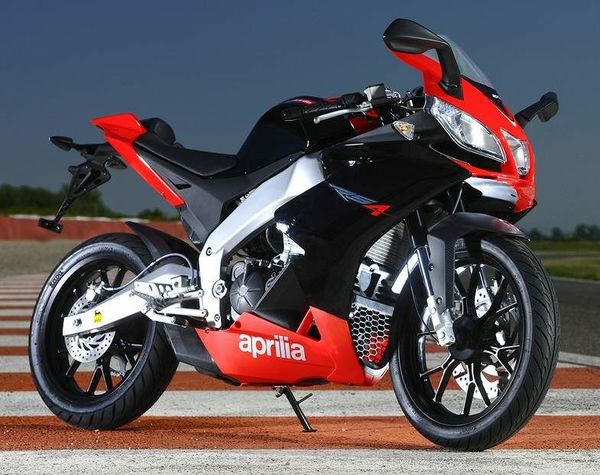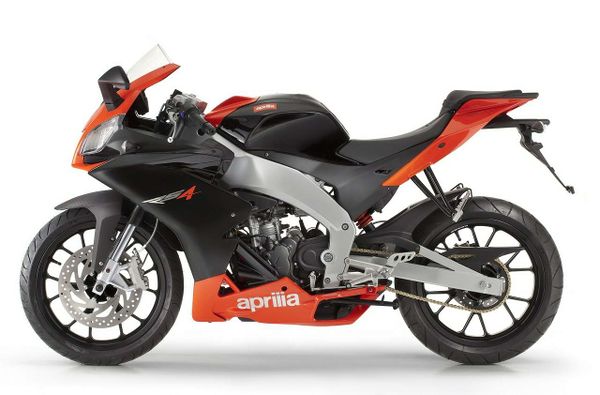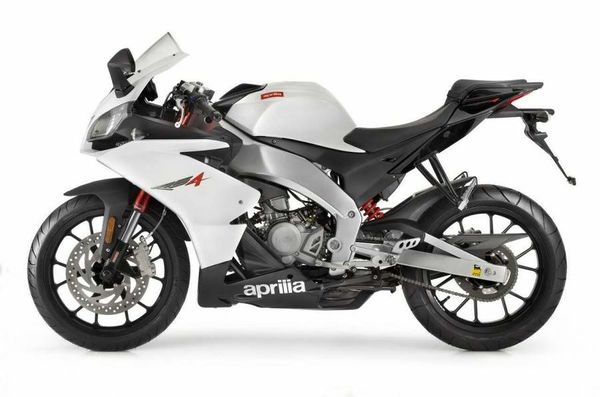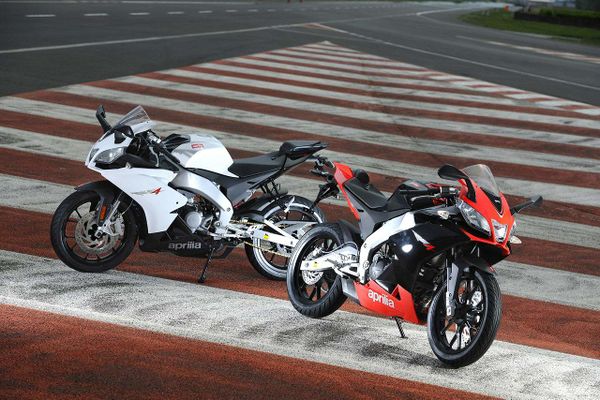Aprilia RS4125
| File:Aprilia-RS4-11--1.jpg | |
| Aprilia RS125 | |
| Manufacturer | |
|---|---|
| Also called | RS125 Tuono, RS 125 Tuono, RS125R, RS 125 R, RS125 Replica, RS 125 Replica, RS125 Replica SBK, RS 125 Replica SBK, RS125 Replica Alitalia, RS 125 Replica Alitalia, RS125 Replica GP, RS 125 Replica GP, RS4125 Replica, RS4 125 Replica, RS4125, RS4 125, RS 125 |
| Production | 2011 |
| Engine | Four stroke, single cylinder, DOHC, 4 valves |
| Compression ratio | 12.5 ± 0.5:1 |
| Ignition | Electronic with CDI capacity discharge |
| Transmission | 6 Speed |
| Frame | Aluminum perimeter frame |
| Suspension | Front: Ø41 mm Upside down fork Rear: Asymmetric swingarm with monoshock |
| Brakes | Front: Single Ø300 mm disc, 4 piston caliper Rear: Single Ø218 mm disc, 1 piston caliper |
| Front Tire | 110/80 17 |
| Rear Tire | 130/70 17 |
| Wheelbase | 1350 mm / 53.1 in |
| Seat Height | 820 mm / 32.3 in |
| Weight | 120 kg / 264.6 lbs (wet) |
| Fuel Capacity | 14.5 Liters / 3.8 gal |
| Manuals | Service Manual |
Engine[edit | edit source]
The engine was a Liquid cooled cooled Four stroke, single cylinder, DOHC, 4 valves. The engine featured a 12.5 ± 0.5:1 compression ratio.
Drive[edit | edit source]
Power was moderated via the Multiple discs, in oil bath.
Chassis[edit | edit source]
It came with a 110/80 17 front tire and a 130/70 17 rear tire. Stopping was achieved via Single Ø300 mm disc, 4 piston caliper in the front and a Single Ø218 mm disc, 1 piston caliper in the rear. The front suspension was a Ø41 mm Upside down fork while the rear was equipped with a Asymmetric swingarm with monoshock. The RS4125 was fitted with a 14.5 Liters / 3.8 gal fuel tank. The wheelbase was 1350 mm / 53.1 in long.
Photos[edit | edit source]
Aprilia RS125
Aprilia RS125

 Aprilia RS125
Aprilia RS125
Aprilia RS125
Aprilia RS125


Overview[edit | edit source]
Aprilia RS4 125
Aprilia's small supersports bikes have been completely revised. Two models dedicated for young enthusiasts who want their first experience in the motorcycling world to be with a proper bike.
- Aprilia RS4 marked a milestone in the evolution of the 125 cc motorcycle.
- For the first time ever, the sportiest bike available for 16 year olds is a
4-stroke.
- For the youngest riders of all, the Aprilia RS 50 embodies all of Aprilia's
technology in a genuine racing replica in just 50 cc.
Aprilia has always been the undisputed leader in the 50 and 125 cc supersports segment, pioneering innovative concepts and solutions and setting trends for its rivals to follow. The Aprilia RS4 125 is the natural successor and most advanced evolution to date of the Aprilia RS 125, the bike that has dominated the 125 cc sports class for years, which set the benchmark for the one-eighth litre sports segment and which is still today the most highly sought after machine among riders competing in the Sport Production category.
Aprilia RS4 125 introduces the highly advanced, all-new 4 stroke powerplant to the sports segment, while adopting styling and technical solutions inherited from the RSV4, the superbike that led Aprilia to victory in the WSBK 2010 championship.
The most significant characteristics of the Aprilia RS 50 and Aprilia RS4 are:
- RS4 125 - single cylinder liquid cooled 125 cc 4-stroke with electronic
injection, 4 valves and double overhead camshafts (DOHC)
Characteristics in common:
- extremely stiff aluminum perimeter frame derived from racing experience
- 41 mm upside down fork
- front brake with 300 mm disc and radial four piston calliper
- Superbike inspired analogue/digital instrument panel
- fairings derived directly from RSV4 project for total aesthetic coherence with
the SBK world champion
DESIGN
The livery and eye-catching forms of the Aprilia RS 50 and RS4 125 echo the looks of the Factory version of the Aprilia RSV4 supersports bike. And the RS 50 and RS4 125 share more than just a family resemblance with the most hardcore street version the bike dominating the world SBK championship.
The design of the fairings and tank, the unique looks of the front end, with the headlights suspended over the gaping air intakes, and the spectacular tapered tail fairing are identical to their counterparts on 1000 cc supersports model that set new standards in terms of style and technical content for the superbike segment.
Extensive aerodynamic studies have minimized surface areas without compromising wind protection, and the fairings showcase the superlative mechanicals of the Aprilia RS 50 and Aprilia RS4 125 rather than conceal them. As a result, the frame and engine are not hidden away but proudly flaunted as fundamental elements of the design of Aprilia's new small supersports models. With the triple headlight, the Aprilia RS 50 and RS4 have a decidedly aggressive look that lends a unique character to the entire front end. The LED taillight merges stunningly into the ultra-compact tail fairing and offers excellent luminosity. Even from behind, the Aprilia RS4 125 is absolutely unmistakable.
The product of extensive wind tunnel testing and race experience, the fairing offers excellent wind protection together with superb aerodynamic efficiency. And as well as contributing to the extremely aggressive looks of the bike, the top fairing and tail fairing also maximize performance in terms of speed.
ENGINES
With the new RS 50 and RS4 125, Aprilia confirms its global leadership in the small capacity sports bike segment, creating models that exceed the expectations of even the most discerning rider.
The sophisticated chassis architecture of the Aprilia RS 50 and RS4 125 is complemented by state of the art engines. The single cylinder 50 cc unit developed by Aprilia for the RS 50 is a water cooled two-stroke with reed valve induction. The lubrication uses a separate mixing system with a variable capacity volumetric pump. The six speed gearbox lets the rider make full use of the performance of this class beating engine.
The Aprilia RS4 is powered by an all new 125 cc water cooled 4 stroke single cylinder engine with four valves and electronic engine boasting a sophisticated double overhead camshaft (DOHC) valve timing system. This state of the art engine produces the maximum power output permitted for the class with a smooth, linear delivery and ecologically - as it meets even the strictest emissions regulations in effect.
With a six speed gearbox allowing the rider to make full use of the power available in all conditions, the Aprilia RS4 offers unbeatable performance in its class not just in terms of absolute power at high engine speeds, but also in terms of usable power band, minimized vibration and outstanding mechanical reliability.
The product of a cutting edge design, the new single cylinder 125 cc unit features dry sump lubrication making it extremely light and compact, allowing Aprilia's engineers to develop a class beating chassis layout.
CHASSIS
The RS 50 and RS4 125 stand head and shoulders above the competition for their superlative chassis layout: developed on the basis of Aprilia's outstanding successes in WSBK and GP 125, the frame consists of die cast aluminum spars with crossed reinforcement ribs. With its state of the art design, this extremely lightweight structure offers exceptional torsional stiffness. The front suspension also boasts a class beating layout, with a sturdy 41 mm upside fork, red anodised stanchion clamps and a wheel travel of 110 mm, while at the rear is a monoshock linked directly to the asymmetric swingarm.
Both the Aprilia RS 50 and RS4 125 boast class beating brake systems: each bike uses a 300 mm steel disc at the front, gripped by a four piston radial calliper, and a 220 mm disc at the rear with a single piston calliper. The 17 wheels are shod with 100/80 rubber up front and a 130/70 tire at the rear.
STANDARD EQUIPMENT AND FEATURES
The multifunctional analogue/digital instrument panel with LCD display draws directly from Aprilia's experience in the Superbike class. The split 6-spoke design of the wheels further emphasises the purposeful character of Aprilia's latest small capacity sports bikes.
On Aprilia RS4, one additional detail underscores the level of sophistication of the bike: the exhaust, which is unmistakably inspired by competition machines, is completely integrated within the lower part of the fairing. A solution that is not just visually effective, but which also contributes significantly to the dynamics of the bike by helping to centralise masses.
The passenger saddle is yet another example of the extreme level of sophistication of these new bikes from Aprilia. Instead of fiddly screws, a practical quick release button allows the passenger seat to be exchanged with the tail fairing cover in an instant to transform the bike from two seat to single seat configuration
Review
The all-new Aprilia RS4 is Aprilias first step away from the 2-strokes that made them famous. The RS125 2-stroke will still be sold (in Europe), but the emergence of this new 4-stroke 125 shows Aprilias direction for the future.
Everybody knows that 2-stroke engines can produce more power than a comparably sized 4-stroke. The RS125 can be tuned to around 33 horsepower, whilst the RS4 125 can only get to about 25 horsepower with a 180cc kit. The RS4 125 cant replace the RS125 performance-wise, but it does benefit from a reliable torquey 125cc four-stroke engine that doesnt need a rebuild every 10,000 miles. The RS4 125 is also more environmentally friendly using less fuel and oil compared to the 2-strokes.
I tested the RS4 125 in a learner-legal version that generates 15 horsepower at 10,500 rpm. Peak torque of 8.1 ft-lb occurs at 8500 rpm. Its 75-mph top speed enables safe riding on motorways, and the engine isnt going to blow up after long runs on the highway. The four-stroke torque curve enables cruising from 8,500 rpm and a very decent fuel range.
The 300mm disc up front offers sharp response.
I, however, tested on a race track, so I spent pretty much all the time testing in the range between 10,000 and 11,000 rpm where the engine pulls much better than anywhere else in the power range. Its a narrow range for riding fast, and I quickly found out that losing revs must be avoided at all cost. Compared to a 2-stroke, though, theres plenty of midrange. I had lots of fun slipstreaming the other journalists on the circuit just like they do in the 125 GP championship, but it got slightly boring as soon as I found myself without anybody to chase down.
The brakes on the RS4 125 are very sharp, consisting of a 300mm disc and a 4-pot radial calliper. I hardly used the 200mm rear brake at all as, lets face it, the speed needed to be brushed off was never great.
The RSVs dry weight is a claimed 295 pounds, which is a lightweight for a 4-stroke but about 30 pounds heavier than an RS125.
Im quite large for the RS4 125, but in the pictures you could briefly think that Im on the RSV4 rather than the RS4. The suspension is not adjustable, and to my surprise Aprilia has found a good standard set-up as I had nothing to complain about chassis-wise. I presume the small motorcycle handles even better with a lighter rider, which I again presume most 16-year-olds are. The tires are of sizes 100/80-17 front and a 130/70-17 rear.
Suspension, though not adjustable, has a surprisingly good standard set-up.
I was impressed with the amount of Ground Clearance when leaned over, and I noticed a considerable loss of revs as soon as I went from full lean to upright position due to the taller effective gearing of the larger part of the tire. I was not aware of this initially, as I sometimes shifted up at full lean, which is natural on a large-capacity bike. But on the 125, its best to just use the motors over-rev zone to better transition as the bike is lifted upright on corner exits. Theres still not enough power to upset the rear tire, and nothing to gain until max power has been reached whilst having the bike stood up.
A quick shifter gives the RS4 a touch of superbike performance.
Aprilia offers a quick-shifter as an accessory, and theres no doubt this is of great benefit to the small 125, as acceleration suffers on the version without quick-shifter. The RS4 125 is pretty much a premium 125 in the first place, but with the quick-shifter its like a superbike for the youngsters.
The pricing in the UK is not that stiff compared to
the competition which mainly are the Honda CBR 125R (£3,270 OTR) and Yamaha YZF
R125 (£4,249 +reg+tax). The Aprilia RS4 125 RRP is £3,999 OTR + £99 for the
quick shifter. The cool little tiddler will hit American dealers early in 2012
at a price yet to be determined.
I only tested the RS4 125 on the circuit, but its evident that the small 125 will work as a very good road bike as well. No expensive 2-stroke oil, just fuel and very little of it. The fairing is nearly identical to the big RSV4 superbike, and two large headlights make sure this 125 looks like any other motorcycle in a cars rear view mirror. The stylish exhaust is hidden low by the fairing, and it sounds a bit more grown up than a 2-stroke.
The seat is sporty, and comfort levels are the same as on any sportbike, and this goes for the ergonomics in general. The rear seat cowling can be replaced by a pillion seat, and underneath theres room for a few bits and bobs. The mirrors are wide and give good view of traffic coming from behind.
Seat comfort and overall ergonomics are in line with most any sportbike.
Conclusion
All in all the Aprilia RS4 125 is a proper dreambike for youngsters, but its also got some benefits for those a bit older who are yet without a full motorcycle license. It looks like a fully grown sportbike and has enough top speed to follow motorway traffic even in restricted form.
Any young rider should be thrilled to zip around on the RS4 125.
Scooters are a good means of transport, but the RS4 125 is for those that really want to ride in the same way as you do on a full-size sportbike. With the added benefit of the quick shifter all you do is push the starter button, engage first gear and then keep the throttle twisted whilst shifting up. Remember to use the clutch when downshifting though
Source
| Make Model | Aprilia RS4 125 |
|---|---|
| Year | 2011 |
| Engine Type | Four stroke, single cylinder, DOHC, 4 valves |
| Displacement | 124.8 cc / 7.6 cu in |
| Bore X Stroke | 58 X 47 mm |
| Cooling System | Liquid cooled |
| Compression | 12.5 ± 0.5:1 |
| Induction | Electronic injection |
| Ecu | Magneti Marelli MIU G3, Ø32 mm |
| Ignition | Electronic with CDI capacity discharge |
| Emission Standard | Euro 3 |
| Starting | Electric |
| Max Power | 11.7 kW / 16 hp @ 10500 rpm |
| Max Torque | 11 Nm / 1.12 kgf-m / 8.1 ft/lb @ 8500 rpm |
| Clutch | Multiple discs, in oil bath |
| Transmission | 6 Speed |
| Final Drive | Chain |
| Gear Ratio | 1st 11/33 (0.33) / 2nd 15/30 (0.50) / 3rd 18/27 (0.67) / 4th 20/24 (0.83) / 5th 25/27 (0.92) / 6th 23/22 (1.05) |
| Frame | Aluminum perimeter frame |
| Front Suspension | Ø41 mm Upside down fork |
| Front Wheel Travel | 110 mm / 4.3 in |
| Rear Suspension | Asymmetric swingarm with monoshock |
| Rear Wheel Travel | 130 mm / 5.1 in |
| Front Brakes | Single Ø300 mm disc, 4 piston caliper |
| Rear Brakes | Single Ø218 mm disc, 1 piston caliper |
| Front Tire | 110/80 17 |
| Rear Tire | 130/70 17 |
| Dimensions | Length: 1953 mm / 76.8 in Width: 740 mm / 29.1 in Height: 1138 mm / 44.6 in |
| Wheelbase | 1350 mm / 53.1 in |
| Seat Height | 820 mm / 32.3 in |
| Wet Weight | 120 kg / 264.6 lbs |
| Fuel Capacity | 14.5 Liters / 3.8 gal |
| Review | Motorcycle.com |
External Links[edit | edit source]
- http://www.motorcycle.com/manufacturer/aprilia/2011-aprilia-rs4-125-review-91121.html
- http://www.motorcycle.com/